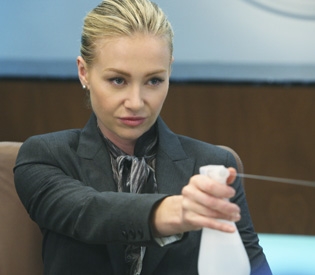Before I begin, I’ll admit that my two favorite shows are Better off Ted and Terriers. Both were cancelled, given the run-around and are apparently only popular with critics and people who are late to everything. And no, I haven’t watched much Archer. I’ll get to it.
The idea that “women aren’t funny” has been around for a long time. Christopher Hitchens theorized that this had something to do with brain chemistry and the evolutionary value of humor. Men need to impress women and they do it through humor. Women, on the other hand, have no need to impress men since men already find women pants-droppingly funny. “Men have to pretend, to themselves as well as to women, that they are not the servants and supplicants. Women, cunning minxes that they are, have to affect not to be the potentates. This is the unspoken compromise,” he writes. Leaving aside the obvious heteronormative bullshit embedded in that comment (as well as all evolutionary psychology), it raises an interesting dichotomy: humor at someone else’s expense and humor at one’s own expense. Popular culture and talking heads seem to agree that women’s high sex status makes them unfit for humor at other people’s expense (too mean, too cruel, coming from the Goddess on her Throne) and therefore the only funny woman is a woman that is self-deprecating to a fault. TV, by and large, reflects that popular prejudice but it is indeed changing. It mostly agrees with the premise that ladybrains are wired only to play damsels in distress, emotional melodrama queens and non-threatening straight foils. All of these archetypes are, after all, women who have lost their pedestal and are therefore capable of humor.
The women of Community, for instance, are flawed but not self-deprecating, certainly not in the way that Tina Fey’s Liz Lemon, Queen of self-deprecating humor and the reigning Champion of the Thunderdome, is self-deprecating. Liz Lemon has stains on her shirt. She’s a woman. That is funny. Liz Lemon, a slob who could do better, is a clear example of the sort of TV woman who is funny because of the dissonance between her status and her reality, at least for the five people who watch NBC programming. Tina Fey’s character is made ugly in order to be funny. Our expectations of attractive women demand this. Even Tina Fey’s uproariously funny Sarah Palin impression relies on the “attractive woman being less than perfect” trope to some degree. In this case, the ugliness of Ms. Palin’s ignorance was enough but the riff still requires that trope for its power. As TV grows up, we see that it is possible for women to both be attractive and funny and self-aware. Community’s Annie, played by the consistently excellent Allison Brie, is not only given actual jokes where she isn’t just a foil but she remains attractive, even when the sexualized parts of her (her boobs) are transferred into the vessel of a monkey that lives in the vents and hoards stationery. The Monkey is literally called Annie’s Boobs. Annie’s Boobs are funny on their own, divorced from Annie, and form the basis of unrelated subplots. In this way, the show allows us to see the real Annie, boobs and all, be funny while still allowing for the kind of humor that is, apparently, only the province of adolescent males.
Only two women on TV, however, are/were playing women with power being funny without apologizing for it. It is no surprise that they are the best female comics on TV. I enjoy Sarah Silverman but she’s a little too complicated for this piece so pardon her exclusion while she bangs Jeff Goldblum in front of Nick Kroll. One, obviously, is Amy Poehler’s Leslie Knope, a high-strung bureaucrat/elected official managing the Parks and Recreation department of Pawnee, Indiana. Not only does she not apologize for power, she wants more of it. She risks her comfortable niche to run for elected office. And, what’s more, she’s good at her job and sincere about her intentions. Those are both things that she should not be able to do under prevailing theories of humor. A sincere, hard-working bureaucrat, of whatever gender, is a mindfuck. The other, and my favorite, is/was Better off Ted’s Veronica Palmer, played in the most insincere way by Portia DeRossi.
Veronica works for Veridian Dynamics, the archetypical evil corporation that subverts all the things people love. Can you think of something suitably evil? An octo-chicken, perhaps, with its extra drumsticks? A motion sensor that ignores black people? Weaponized pumpkins? Nicotine-flavored ice cream? Veronica is a woman whose unapologetic attractiveness is intimidating, which makes her the perfect boss for the cubicle drones she commands. She is in total charge of her sexuality, a point made clear not just by her subordinates dropping trou at a moment’s notice, but by her affair with the magician Mordor. While she worries that having people know about her double life as a magician’s assistant might harm her, ultimately when she performs, she really does perform. She doesn’t turn her sexuality into the joke in the end but instead, turns our gaze into the joke. There is not an Evolutionary Psychologist/Pseudo-scientist alive that can explain why Portia De Rossi/Veronica Palmer is fucking amazing. She is the ultimate Goddess on her Throne, out of reach and cold. And still funny. And she never does tell you where she hides the dove.
Seriously, guys, how could you cancel this?

